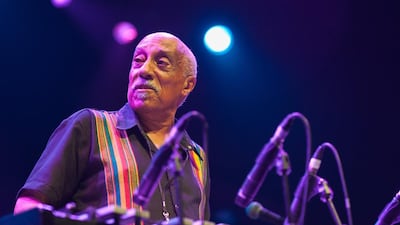If you are a long-time Abu Dhabi resident and concert goer, you may have unknowingly attended a gig by a legend.
Ethiopian composer and artist Mulatu Astatke, known as the founder of Ethio-jazz, recalls spending three months in the capital 25 years ago as part of a hotel residency.
“I was staying at your Sheraton hotel,” he recalls with a laugh. “That was such a beautiful experience. I was there for two months staying at the hotel and performing with my group called, The All Star Band. I would play dance music, some Arabian music, and I had some fantastic Ethiopian singers with me. We had some great musicians and it was full every night and it all felt like a party.”
Build it and they will come
The 71-year-old is set to return, to a grander stage this time around; he is headlining Friday’s concert at the opening weekend of Warehouse421 in Abu Dhabi’s Mina Zayed.
A lot has changed since Astatke’s first stint in the capital. At the time his pioneering gifts were only renowned within tight-knit groups of jazz aficionados. The circle gradually expanded in the mid-1990s when vinyl junkies and DJs began sourcing his hard-to-find vintage 1970s material in their thirst for new sounds.
Another twist of fate arrived in 1998 when the hipster Parisian music label Buddha Musique released Éthiopiques 4: Ethio Jazz & Musique Instrumentale 1969-1974 – a compilation dedicated to Astatke's career-shaping period. Before long, the term Ethio-jazz became known as a bona fide genre and Astatke's heady sounds were sampled by hip-hop greats including Kanye West, Nas, Madlib and Damian Marley. The transformation was completed when cult film director Jim Jarmusch used four Astatke compositions in the soundtrack for his critically acclaimed 2005 dark comedy Broken Flowers.
Astatke built on that by releasing a series of well-received albums inlcuding his latest, 2013's Sketches of Ethiopia. When quizzed about his changing fortunes, Astatke shrugs it off. He explains that he sees his late success the same way he viewed his previous relative obscurity: it is simply part of being a full time musician.
"I have always been working and been busy, that has never changed," he says. "I had a big audience in Europe and Japan and I played to many people all the time. But yes, when Broken Flowers came out my audience doubled. I think that where, before, the music fans came, now also the film goers started coming to my shows and I really have to thank Jim for this."
As it sounds
While Jarmush indeed played a major part in ushering a new audience for Astatke, the latter's sound was equally responsible for the success of Broken Flowers.
Astatke's compositions – with beats that rumble and in some cases grind, those dramatic spiralling off-kilter horns and throbbing vibraphone – not only helped to form Broken Flowers' quirky personality, but remains an apt illustration of what Ethio-jazz is all about. As Astatke explains it, the genre is what it sounds like, literally: "There are five notes to compose on Ethiopian music. Ethio-jazz is basically using those five notes and putting it together on top of the other 12 [the standard 12-note chromatic scale]" he says. "This is not so easy. I am trying to combine both of them together but at the same-time keep the beauty, harmony, sounds and character of Ethiopia. I did not want to loose my country in the mix. Ethio-jazz is where Ethiopia will always be on top of the mix."
Meeting the masters
Born in Jimma in Ethiopia’s west, Astatke’s parents sent him to Wales to study engineering in the mid-1950s. However, buoyed by his enthusiasm for music, Astatke then moved to London’s Trinity College of Music, which provided him “with an understanding of the different dimensions of music”.
It was in 1958 when Astatke found his artistic calling. Enrolled as the first African student in Boston’s Berklee College of Music, he studied vibraphone and percussion and developed a keen interest in jazz – particularly studying the greats, such as Duke Ellington.
It wasn’t long before the student met the master: Astatke recalled the honour of meeting Ellington when the composer and band leader arrived in the Ethiopian capital in the mid-1960s.
“Ellington is really a great personality,” he recalls. “He was in Addis Ababa and he came here as part of the jazz ambassadors programme. I did one beautiful big arrangement of Ethiopian music for his band and we played together. It was amazing because he was one of my heroes. I used to really analyse his music and it was a privellege to play with his band.”
During his student days Astatke also met another jazz great, the saxophonist and composer John Coltrane, at the legendary Birdland Jazz Club in New York City. “An interesting man,” he says. “He had a very high respect for Africa and African music.”
The next generation
With his own place in jazz history seemingly cemented, Astatke is now working on sharing his knowledge with the next generation. As well lecturing in universities back home, Astatke opened his own club, The African Jazz Village, in Addis Ababa. For four nights a week, the venue has fast established itself as the main hub to check out some of hottest sounds emerging from the Ethio-jazz scene. Those who are lucky enough, they may also stumble upon an impromptu gig from Astatke himself. When asked which nights are best to catch him perform, Astatke initially demurs, stating his desire is not to steal the thunder from the younger outfits performing that night. However, pressed a little further, Astatke gives in: “Well, I am always travelling,” he says. “But if I am around, you should probably visit on Wednesday nights.”
• Mulatu Astatke performs at Warehouse 421 at Mina Zayed on Friday at 8.30pm. Free entry. For details visit www.warehouse421.ae
sasaeed@thenational.ae


